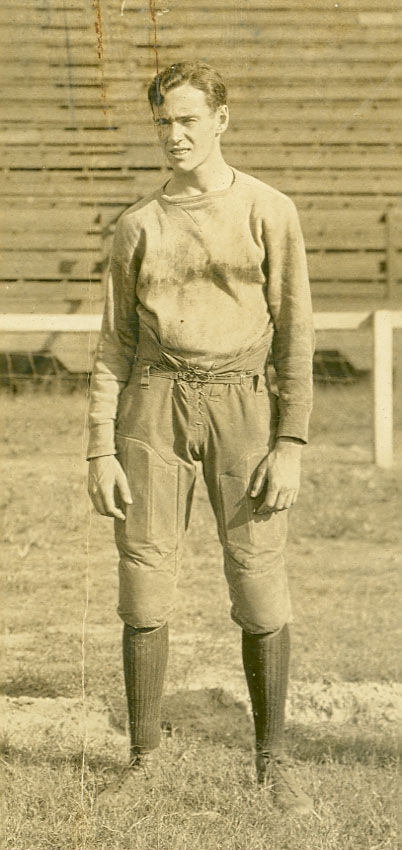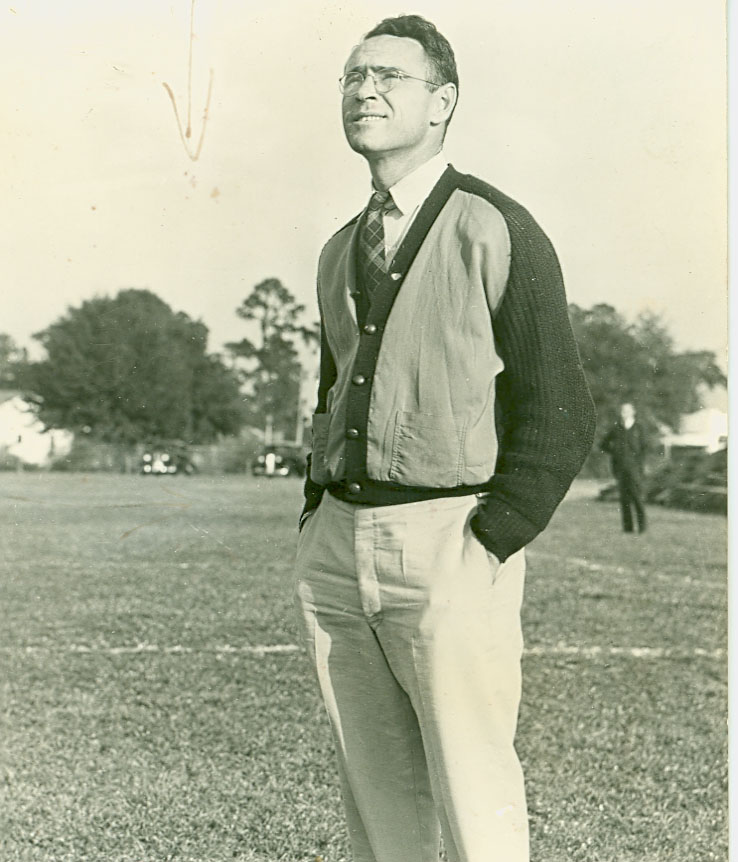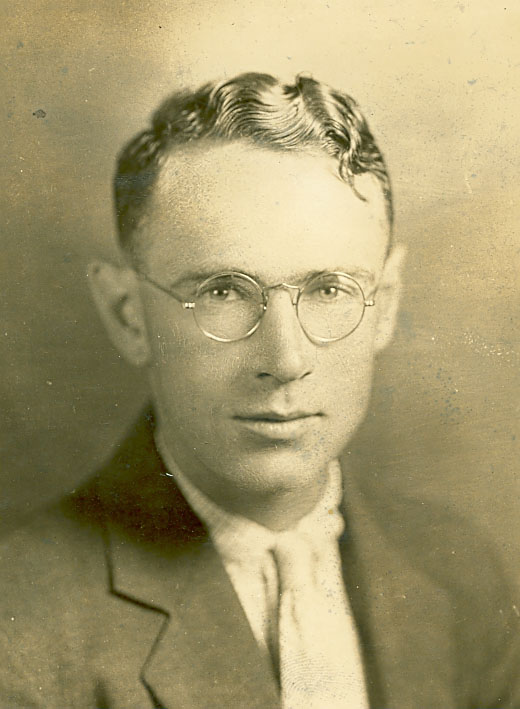|
 John “Jack”
Witherspoon McDowall, son of John W. M. and Sarah McDowall, originated in
Newberry, Florida. McDowall received preparatory education first at Florida
High School in Gainesville from 1922 to 1923, then at the Rockingham, North
Carolina High School until 1924. In high school, McDowall became heavily
involved in sports, such as football, basketball, track, and baseball. He
joined the All-Florida End and the All-Florida Guard, broke the record for
the high jump, captained the baseball team, and won both football
and
basketball championships. In addition, he also joined the All-North
Carolina High School End, broke the Southeastern Meet record of Florida for
collages, and became the All-North America first basemen. In 1924, he
attended the North Caroline State College, from which he received his
Bachelor of Science degree in 1928. While at the college, he participated
in football (freshman quarterback), basketball (captain in 1927 through
1928), baseball, track, played on the Pacific Coast All-Southern Team, and
broke the state record for the high jump. Also in 1928, Who’s Who in
American Sports included McDowall on its list. After graduation, he
then became the coach for Asheville High School in North Carolina until
1928, his football team winning nine out of ten games; it might have made
the championship but for an outbreak of influenza. At one point in the
season, his basketball team won twenty games straight. McDowall joined
organizations such as Blue Key, the Theta Kappa Nu fraternity, as well as
receiving an honorary membership to the Golden Chain. In addition, he
obtained a master’s degree in education from Duke University (Durham, North
Carolina) in 1935. John “Jack”
Witherspoon McDowall, son of John W. M. and Sarah McDowall, originated in
Newberry, Florida. McDowall received preparatory education first at Florida
High School in Gainesville from 1922 to 1923, then at the Rockingham, North
Carolina High School until 1924. In high school, McDowall became heavily
involved in sports, such as football, basketball, track, and baseball. He
joined the All-Florida End and the All-Florida Guard, broke the record for
the high jump, captained the baseball team, and won both football
and
basketball championships. In addition, he also joined the All-North
Carolina High School End, broke the Southeastern Meet record of Florida for
collages, and became the All-North America first basemen. In 1924, he
attended the North Caroline State College, from which he received his
Bachelor of Science degree in 1928. While at the college, he participated
in football (freshman quarterback), basketball (captain in 1927 through
1928), baseball, track, played on the Pacific Coast All-Southern Team, and
broke the state record for the high jump. Also in 1928, Who’s Who in
American Sports included McDowall on its list. After graduation, he
then became the coach for Asheville High School in North Carolina until
1928, his football team winning nine out of ten games; it might have made
the championship but for an outbreak of influenza. At one point in the
season, his basketball team won twenty games straight. McDowall joined
organizations such as Blue Key, the Theta Kappa Nu fraternity, as well as
receiving an honorary membership to the Golden Chain. In addition, he
obtained a master’s degree in education from Duke University (Durham, North
Carolina) in 1935.
McDowall
joined the Rollins College faculty in 1929, where served as director of
physical education and coach from 1929 to 1931, and as director of physical education and athletics for men from 1931 to 1939. In 1937, McDowall held
the position of chairman of the division of ph ysical education and athletics
until 1939, becoming in that year the professor of physical education for
men (1939 to 1944, and again in 1949 to 1957). He also assumed role of
chairman of the division of health and physical education from 1942 until
1943, director of physical education from 1944 to 1949, professor of
psychology from 1944 to 1945, chairman of the division of health and
physical education from 1943 to 1943, as well as that of director of
athletics and chairman of the division of health and physical education
(1949 to 1953). Although McDowall retired from active teaching at Rollins
in 1956, he acted as a consultant to the athletic department until 1969.
His attitude on coaching focused on character development through sports,
thus precluding effortless victories. “I wouldn’t knowingly schedule a game
with any team Rollins could lick 40-0… and I wouldn’t schedule a game with a
team that could lick us 40-0, either. What the public wants to see and what
is best for the players, too, is even contests.”[1]
Owing to his distinctive contributions to the College, McDowall received the
Rollins Decoration of Honor in 1942. In 1965, North Carolina added him to
their Sports Hall of Fame. ysical education and athletics
until 1939, becoming in that year the professor of physical education for
men (1939 to 1944, and again in 1949 to 1957). He also assumed role of
chairman of the division of health and physical education from 1942 until
1943, director of physical education from 1944 to 1949, professor of
psychology from 1944 to 1945, chairman of the division of health and
physical education from 1943 to 1943, as well as that of director of
athletics and chairman of the division of health and physical education
(1949 to 1953). Although McDowall retired from active teaching at Rollins
in 1956, he acted as a consultant to the athletic department until 1969.
His attitude on coaching focused on character development through sports,
thus precluding effortless victories. “I wouldn’t knowingly schedule a game
with any team Rollins could lick 40-0… and I wouldn’t schedule a game with a
team that could lick us 40-0, either. What the public wants to see and what
is best for the players, too, is even contests.”[1]
Owing to his distinctive contributions to the College, McDowall received the
Rollins Decoration of Honor in 1942. In 1965, North Carolina added him to
their Sports Hall of Fame.
McDowall, in
addition to having an important role as coach and professor, also had
memorable achievements within the greater Florida community. From 1943 to
1944, McDowall functioned as a United States Naval Lieutenant during World
War II. In 1952, he successfully ran as a Democrat[2]
for Orange County commissioner on a platform consisting of pro-business
administration, better roads, country beautification, the Sports Fishermen’s
Program, and conservation. Re-elected in 1956, McDowall held the position
until 1960. McDowall died on May 25, 1969 from a heart condition. His
wife, Sally McDowall, and a daughter, Sally F. Blake, survived him.
McDowall received a memorial service at Knowles Chapel on the Rollins
Campus.
- Angelica Garcia
[2]
Orlando Evening Star, (May 26, 1969).
|


